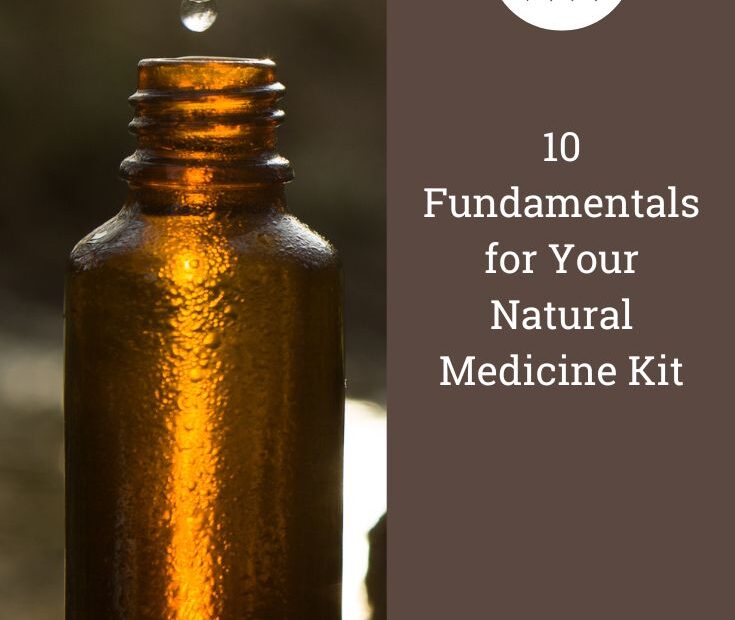Some of the links in this post may contain affiliate links for your convenience. As an Amazon associate I earn from qualifying purchases.
A time might come when a quick trip to the store or pharmacy for medical supplies isn’t an option. Visiting a doctor might not be feasible either, but fortunately, there exist tried-and-true remedies that could be invaluable. Keeping a natural medicine kit within reach can effectively equip you to handle situations demanding medical attention.
Embracing a natural medicine kit can be a powerful step toward living a healthier and toxin-free lifestyle. (Here’s a great article about herbal antibiotics.) By incorporating remedies derived from nature’s own resources, you’re minimizing your exposure to artificial chemicals and additives often found in conventional products.
Read more about how you can get started with herbalism here, where I give several different options to fit your lifestyle.

What should be in your natural medicine kit
Here’s a rundown of essential items to include in your natural medicine kit for versatile and holistic health support for common ailments.
- Aloe vera plant – Anyone who has had a sunburn knows the soothing relief of aloe vera and its wonderful healing properties. Having an aloe vera plant at home ensures ready availability without the need for store trips; these hardy plants thrive indoors and outdoors. It can be used in wound care and is also equally adept at treating insect bites. It’s also possible to purchase an aloe vera gel, although it will contain additives. 100% aloe gel is best. NOTE: Do not use aloe on 3rd or 4th degree burns or severe sunburns; these require medical attention.
- Essential oils – Exercising caution and proper usage, essential oils are a versatile resource for various conditions, and numerous guides list their application. My preferred essential oil choices include lavender, peppermint, lemon, a specialized blend for muscle discomfort, eucalyptus, and Thieves Oil; these are the ones I use the most. Also, independent tests confirm that the more affordable Rocky Mountain Oils are just as effective and pure as some premium brands.
- Lamb’s ear plant – Beyond its whimsical appeal in gardens due to its velvety texture and visual charm, the lamb’s ear plant doubles as a functional resource. It’s capable of serving as a natural bandage, boasting antiseptic, anti-inflammatory, and antibacterial qualities.
- Teas – Similar to oils, teas offer remedies for diverse issues such as drowsiness, insomnia, and upset stomachs. They’re also beneficial for boosting vitamin intake.
- Vodka – Infuse vodka with various herbs or plants to make tonics. A hot pepper tonic aids recovery from colds and congestion. Even if you’re a teetotaler, it’s a good idea to keep a few different types of alcohol.
- Vitamin E ointment – This inexpensive ointment works remarkably fast to heal skin rashes. (Tip – this is the best diaper cream I have come across.)
- Coconut oil – While this is usually used for cooking, it can also be used as a carrier oil for essential oils and as a skin lotion. It has so many great uses and can be purchased in large quantities.
- Amber bottles with eyedroppers and small tins – As you begin mixing up your own concoctions, like this recipe for eczema cream, you’ll need containers for creams, oil blends, and salves. Amber or dark blue glass is recommended because light can degrade these substances. Oxygen will quickly turn oils rancid, so keep these bottles and tins tightly capped.
- Midwifery book – If there is any chance a female living in your house could become pregnant, having a midwife or birthing reference book would prove invaluable in situations where seeking immediate medical care might not be possible.
- First aid essentials – Sometimes the most basic items like gauze and tape are all that is needed to fix a medical issue. Make sure to have first aid items and a first aid reference book on hand. Check out what this man has in his medical aid kit.
Bonus Item
When muscle aches strike, they can be incredibly debilitating. Having a massage roller to help sore muscles stretch out and heal can help a person keep moving.
Test for skin irritation
Remember, sometimes natural remedies can cause skin irritation in some people. It’s a good idea to test a small amount on a small area of skin before using it on a larger area. If you notice any redness, itching, or discomfort, stop using it and wash the area with water. If the irritation persists, it’s best to consult a healthcare professional.
Know when to see a doctor
While a natural medicine kit can be incredibly useful for addressing common discomforts and minor ailments, it’s important to know when to seek medical attention from a doctor. If you or someone you’re caring for experiences severe or worsening symptoms, it’s best to consult a healthcare professional. A doctor’s expertise is essential for diagnosing and treating more serious conditions, ensuring that proper medical care is provided when necessary. Your natural medicine kit can serve as a valuable complement to conventional healthcare. However, knowing the limits of self-care and recognizing when expert medical guidance is needed is crucial for your well-being.
Putting these tools in your natural medicine kit can help you take care of yourself and your family in a more natural way. You’ll be ready to deal with different situations and feel better about your health.
What else do you recommend for a natural medicine kit?
Originally published February 22, 2018.
“This is for informational purposes only and is not intended to diagnose, treat, or prescribe for any disease. Consult your personal medical professional.”
Sarah Anne Carter is a writer and reader. She grew up all over the world as a military brat and is now putting down roots with her family in Ohio. Visit her at SarahAnneCarter.com
